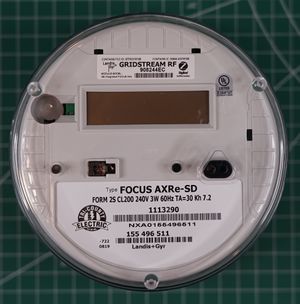Difference between revisions of "Advanced Metering Infrastructure"
Jump to navigation
Jump to search
(Added image and YouTube link) |
|||
| Line 1: | Line 1: | ||
Advanced Metering Infrastructure (AMI)<ref>https://en.wikipedia.org/wiki/Smart_meter#Advanced_Metering_Infrastructure</ref> refers to systems that measure, collect, and analyze energy usage, and communicate with metering devices such as electricity meters, gas meters, heat meters, and water meters, either on request or on a schedule. | Advanced Metering Infrastructure (AMI)<ref>https://en.wikipedia.org/wiki/Smart_meter#Advanced_Metering_Infrastructure</ref> refers to systems that measure, collect, and analyze energy usage, and communicate with metering devices such as electricity meters, gas meters, heat meters, and water meters, either on request or on a schedule. | ||
| − | + | [[File:LandisGyrResidentialMeter1.JPG|thumb|Landis+Gyr Residential Power Meter]] | |
| + | <youtube width="320" height="240">gYowTR3Dfdk</youtube> | ||
There are various methods used to report power usage back to the utility including cellular, power-line and mesh networked power meters operating in the ISM bands<ref>https://en.wikipedia.org/wiki/ISM_band</ref>. | There are various methods used to report power usage back to the utility including cellular, power-line and mesh networked power meters operating in the ISM bands<ref>https://en.wikipedia.org/wiki/ISM_band</ref>. | ||
Revision as of 12:59, 12 February 2021
Advanced Metering Infrastructure (AMI)[1] refers to systems that measure, collect, and analyze energy usage, and communicate with metering devices such as electricity meters, gas meters, heat meters, and water meters, either on request or on a schedule.
There are various methods used to report power usage back to the utility including cellular, power-line and mesh networked power meters operating in the ISM bands[2].
